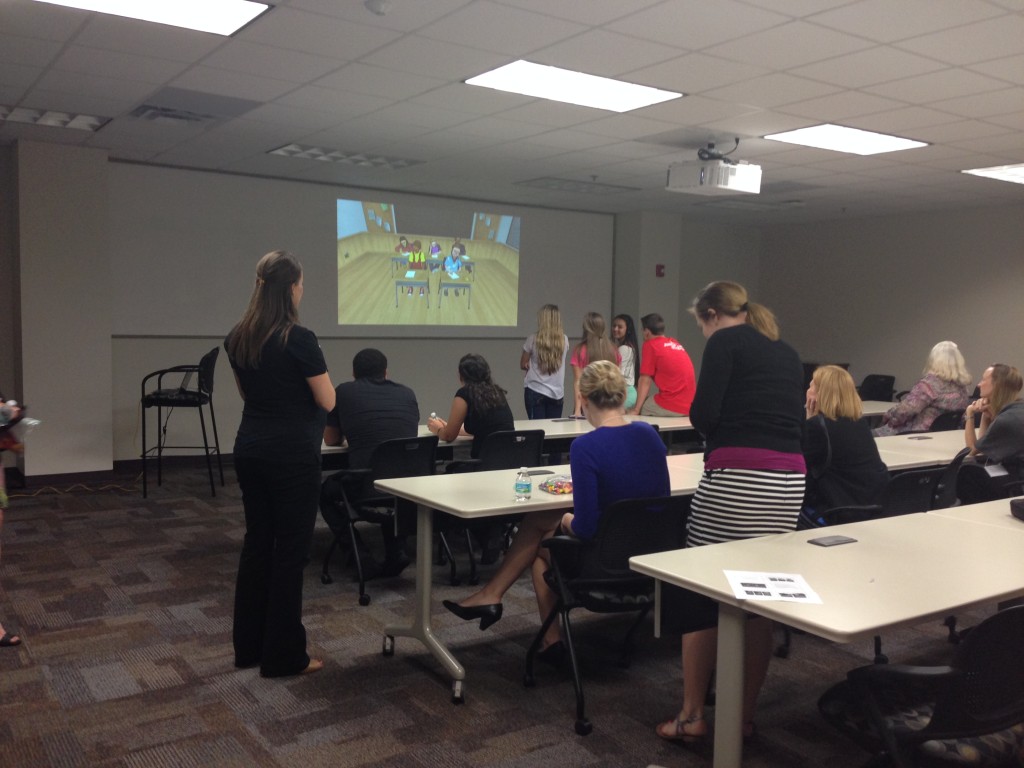
“Teachers need as much practice doing the teaching skill as our students need learning the academic skill.”
One of the major challenges facing both new and experienced teachers is how to offer feedback on classroom techniques and lessons that are helpful and seen as non-threatening.
TeachLivE does this by mixing the worlds of the classroom and features of a video game.
With the use of artificial intelligence to monitor performance and the assistance of a very friendly band of teen student avatars, TeachLivE! is a new simulator that puts educators into a whole new game – one where the improvement of their teaching is the only thing that matters.
With TeachLivE, professional development is timely, challenging and personal. Real life, essential teaching practices – from core management skills to differentiated instruction across content domains – are fine-tuned and analyzed in real time, with one simple but essential goal: educational improvement through more informed and responsive teaching.
TeachLivE is an innovative program that utilizes a playful, game-like environment to support pre-service and in-service teachers (especially those working in special education environments) in improving the way in which they build lessons and their in-class techniques.
This virtual lab was developed through a unique partnership between education and computer science professors at the University of Central Florida. It provides prospective and experienced teachers the opportunity to interact with simulated students in a safe environment. It thus reduces any risk to real students and allows teachers to hone their craft in a fun and engaging way.
This video case study captures a collaboration between TeachLivE and leaders from the Kennedy Krieger Institute, an internationally recognized institution dedicated to helping children and adolescents with severe communication and learning disorders.
Based on their work, we asked the TeachLivE team a few questions about their work and what they have learned working with teachers and technology. Those interested in what teachers can take away from the Quest2Teach project can find more at the Institute of Play’s website.
gamesandlearning.org: What kind of training should game developers plan on producing if they want teachers to use your game / system?
TeachLivE: It needs to be realistic and impactful on their practice and student learning in a short amount of time. Teachers are very busy with lots of demands so portability and direct impact are critical in their work.
gamesandlearning.org: What role have developers played in shaping the professional development plans? Is their involvement helpful? Necessary?
TeachLivE: Our work is trans-disciplinary and we have needed modelers, computer scientists, teachers, teacher educators and digital artists to develop our tools. The collaboration across disciplines is critical to create disruptive technology.
gamesandlearning.org: How prescriptive should game developers be in suggesting lessons and objectives for teachers that use their games?
TeachLivE: Being too prescriptive without direct input from an array of grade levels and years of experienced teachers will ensure that what is created will never used! The buy-in of teachers is critical to anything developed.
gamesandlearning.org: How can this program be implemented elsewhere? Is the program scalable? What would be some challenges that one may face?
TeachLivE: The program is currently being used in a total of 50 university and partnership districts. The program is scalable. The issue some partners have faced is securing fees for the hourly use or getting technology support personnel.
Additional Resources
- TeachLive summary
- Teacher Training in Virtual Environments — Research into TeachLivE
- Using Virtual Technology to Enhance Field Experiences for Pre-Service Special Education Teachers
- The Potential of Simulated Environments in Teacher Education Current and Future Possibilities
About the Video Case Series
Data from the 2012 Joan Ganz Cooney Center national teacher survey showed that few teachers are exposed to games-based learning in their pre-service training, and that teachers usually provide their own ongoing professional learning on games and learning. Thus, as a follow-up on the 2012 series of video case studies on teachers using digital games in the classroom, this series looks at how teachers can be exposed to games through various forms of PD. From a game-based approach to teacher education at ASU to play-based professional learning for informal learning environments at TASC, this series takes the viewer on a journey of innovative and novel approaches to teacher PD.
The series is a project of the Games and Learning Publishing Council and funded by the Bill and Melinda Gates Foundation. The series is produced by the Joan Ganz Cooney Center and the Institute of Play.
